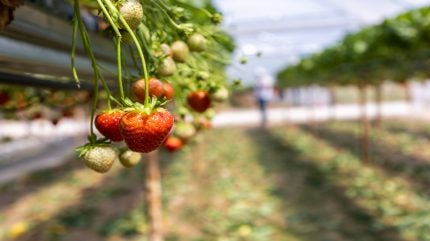
British multinational retailer Marks & Spencer (M&S) is providing £1m ($1.3m) in funding annually through its Plan A Accelerator Fund for “industry-first innovation” projects to support its goal of reaching net zero by 2040.
With targets now revalidated by the Science Based Targets initiative, the projects will use innovation and technology to expedite reductions in scope 3 emissions [indirect emissions which are a consequence of the activities of an organisation but occur from sources not owned or controlled by it].

Discover B2B Marketing That Performs
Combine business intelligence and editorial excellence to reach engaged professionals across 36 leading media platforms.
The retailer stated that it has a “clear glidepath to becoming net zero across the entire supply chain”, a decade earlier than the UK government’s strategy.
In 2025, M&S is funding key projects to reduce emissions from agriculture. Trials are underway to enhance British strawberries, a customer favourite.
M&S has introduced innovative varieties and combined AI technology with bumble bees for precision pollination, which has almost doubled bee activity in trial farms, potentially improving strawberry yield and consistency.
Another project funded by the Plan A Accelerator Fund is exploring a circular approach to agricultural waste by using biochar on chicken farms.

US Tariffs are shifting - will you react or anticipate?
Don’t let policy changes catch you off guard. Stay proactive with real-time data and expert analysis.
By GlobalDataThe ChickenChar trial aims to reduce ammonia emissions, improve animal welfare, and enhance the effectiveness of organic fertilisers by retaining nutrients in chicken manure.
Further projects will investigate methane output in Aberdeen Angus cows, grow net zero wheat, and trial new energy-efficient technology in stores.
M&S corporate affairs and environmental, social and governance director Victoria McKenzie-Gould stated: “M&S’s success as an own-brand retailer is borne from deep relationships with our supplier partners which supports a long-term approach to investment in innovation and quality, and a shared belief in the value of doing the right thing.
“This same approach is helping us to become a net zero business by 2040 through our annual £1m Plan A Accelerator Fund with which we fund new and small-scale or untested solutions in collaboration with our supply base.”
Previous initiatives have included making store fridges more efficient and partnering with Polytag to track plastic packaging recycling.
M&S’s efforts in sustainability extend from fashion and home goods to food production.
In early July 2025, the retailer announced that it will invest £300m ($411.3m) in the financial year 2025 (FY25) to accelerate the rotation and renewal of its stores.





